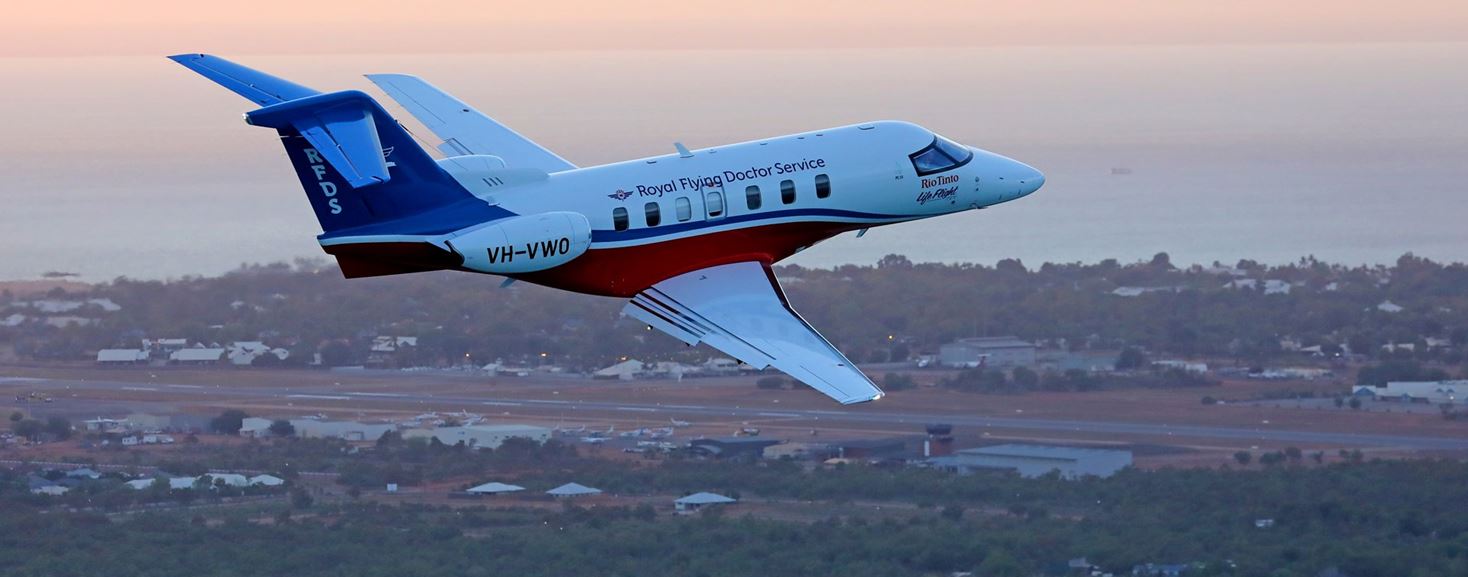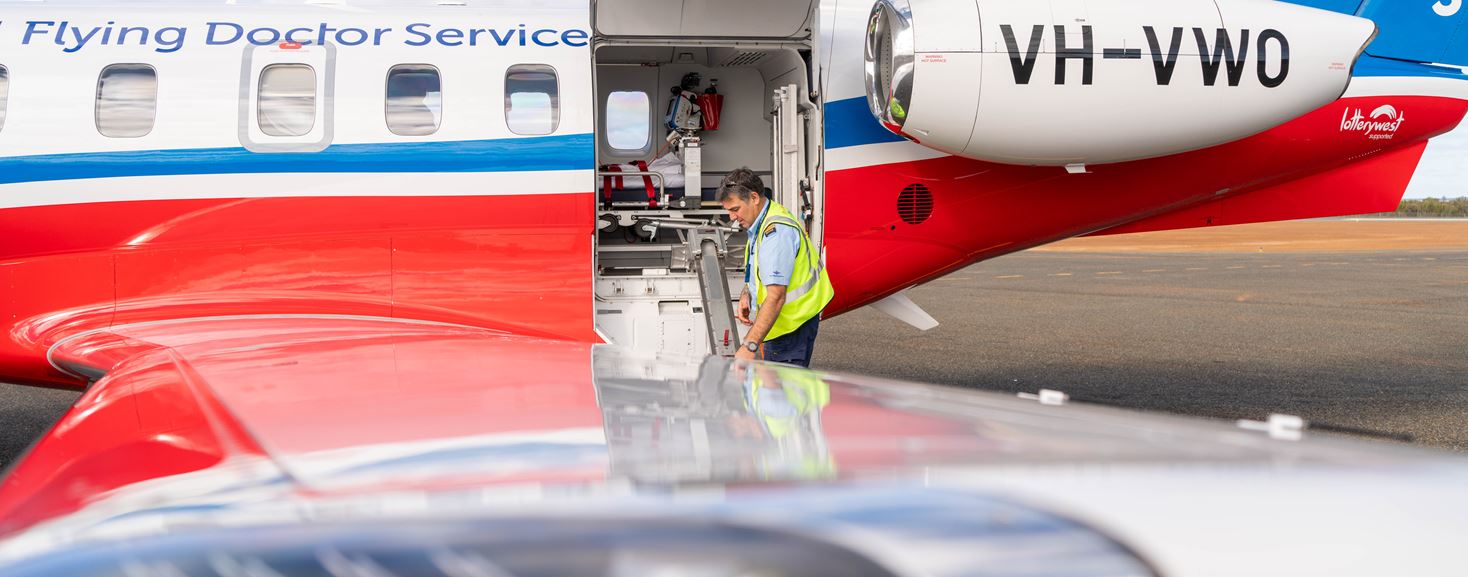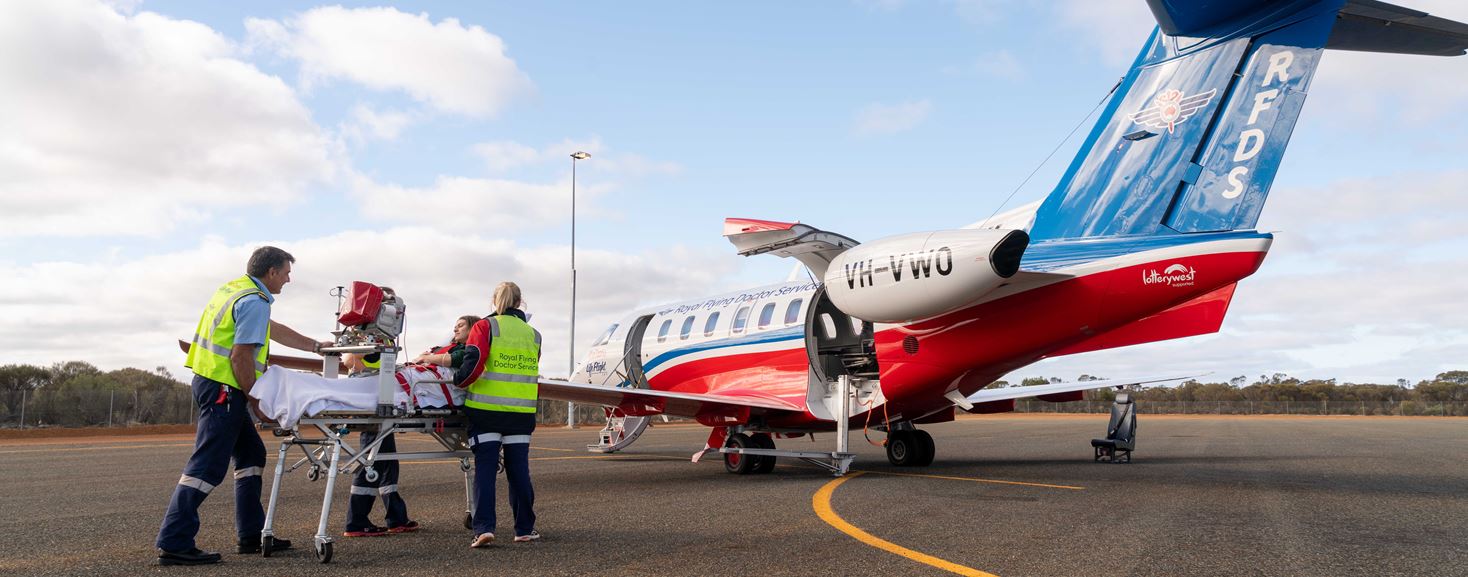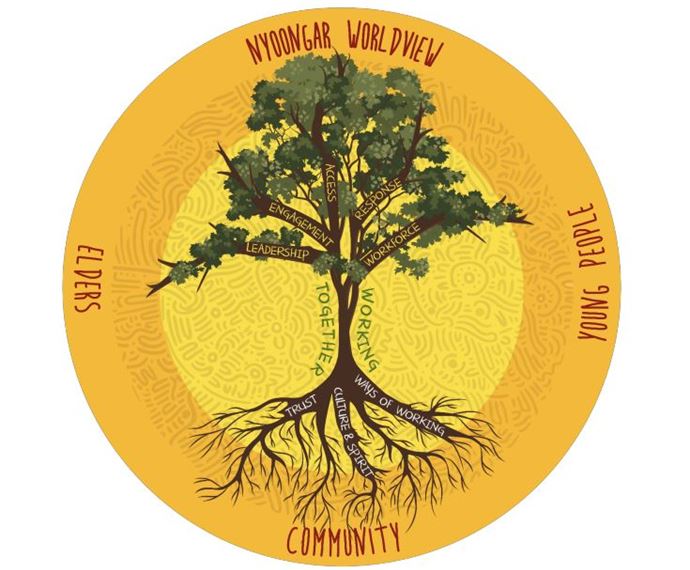Flying high to advance health outcomes
The Royal Flying Doctor Service (RFDS) provides critical 24-hour aeromedical services to people living, working, and travelling across Australia. The Western Australian operation of the RFDS represents the largest area in the organisation, servicing more than 2.6 million square kilometres.
Towards two new jet aircraft and equipment to enhance the delivery of critical 24 hour health services to improve and save lives throughout WA.
Royal Flying Doctor Service of Australia (Western Operations)
12/18/2018
$31,131,000
Lotterywest
$6,500,000
Statewide
General Community
- Contribution to health equity of regional Western Australia by advancing health outcomes for patients across the State.
- Reduction in long distance travel times for critical patient transfers.
- Increased capacity time to carry stretchered patients and medical teams.
- Increased safety, comfort and communication capabilities in the PC-24 jets.
- Close collaboration with clinical teams to design the fit out of the new jets.
- Building on existing partners who understood the organisation's mission and had aligned values.
- Planning to collect and evaluate data from the outset.

Opportunity
At the time of applying for a Lotterywest grant in 2019, RFDS Western Operations (WO) had a fleet of 16 PC-12 aircraft and a Hawker 800 Life Flight Jet. In the 2017-18 year, the fleet transported nearly 9,000 sick and injured patients for treatment and delivered primary health and dental care clinics to over 15,000 patients.
Due to challenging weather conditions and frequent landings on unsealed airstrips or closed highways, the workload carried by the fleet meant the PC-12 aircraft required replacement, on average, every ten years. With several fleet aircraft anticipated to reach the end of their functional life in 2018 and 2019, RFDS developed plans to purchase and fit out two aeromedical PC-24 jet aircraft to help the organisation meet the growing demands of WA’s population, and deliver improved patient outcomes.
Approach
RFDS WO identified the PC-24 jet aircraft as the best fit, due to several major benefits including:
- The aircraft speed significantly reduces flight times, resulting in faster response times and patient access to services and delivery to the health care destination.
- The aircraft range and increased fuel capacity provides the ability to travel longer distances without refuelling.
- The aeromedical fit out includes capacity for three stretchered patients, or two neonatal cots to be transferred at the same time.
- It provides increased safety, comfort, and positive health outcomes of patients, as well as improved capabilities for communication.
- The flexibility created in the RFDS WO fleet between the PC-24 jets and the PC-12 jets. While PC-12 jets remain the best option for short flights and short runways, PC-24s are the better option for long-haul flights.
In addition to $6.5 million from Lotterywest, funding from Rio Tinto and the Commonwealth Government was also secured to proceed with the purchase of two PC-24 jets.
Impacts and outcomes
The first PC-24 jet was integrated into the RFDS WO fleet in December 2018, with the second taking flight in February 2019. Since then, the jets have contributed to health equity of regional WA by advancing health outcomes for patients across the State.
The design and fit out of the PC-24 jets was underpinned by the RFDS’ commitment to innovation, being the first time in the world a PC-24 jet had been fit out with state-of-the-art aeromedical equipment. The customisation also enabled RFDS WO to carry up to three stretchered patients and two medical teams at a time.
With the ability to travel at speeds of more than 770km per hour, the jets have significantly reduced long distance travel times for critical transfers when compared to the RFDS’ PC-12 turboprop aircrafts. In this way, the jets put time on a patient’s side when they need it most and improves RFDS’ ability to respond to Western Australians around the state on what may be one of the worst days of their lives.

The successful integration of the two PC-24 jets had such a positive impact on the organisation’s operations and associated health outcomes, that between 2020 -2022 RFDS WO was able to access a third PC-24 jet on loan from RFDS South Australia/Northern Territory. In 2022, with the support of Rio Tinto, RFDS WO purchased their own third PC-24 jet. This further built on RFDS’ capacity to offer 24-hour aeromedical emergency services across the state. The third jet strengthened RFDS’ aircraft assets, safeguarding future operations to enable them to continue to work as a vital link in the health network of WA.
The PC-24s have been crucial to improving health outcomes across the state, including during the 2022 Horizontal Falls mass casualty incident in the Kimberley, when 28 patients required emergency retrieval after a boat hit a rock wall at high speed. All three PC-24 jets were deployed to evacuate patients from Koolan Island to Broome and Perth, so they could receive care for traumatic injuries sustained in the incident.
The larger capacity and faster speed of the jets enabled more patients to be retrieved more quickly from the incident, resulting in all casualties being evacuated prior to nightfall. The PC-24s halved the time it would have taken to retrieve the patients using propeller planes.
The jets were also utilised during the response and recovery phases of the Kimberley floods caused by ex-Tropical Cyclone Ellie in late 2022. The PC-24s enabled RFDS WO to meet the increased service demands in the region, especially for patients requiring transport to hospital care in Perth.
As of September 2023, RFDS WO has 13 pilots qualified to fly the PC-24 jets and 9 Licenced Aircraft Maintenance Engineers who work on the jets.
From the time of purchase until September 2023, the PC-24 jets have contributed to:
3,364


Retrievals in the Kimberley
276


Retrievals in the Great Southern
387


Retrievals in the Goldfields
958


Retrievals in the Midwest
2,092


Retrievals in the Pilbara
10


Retrievals in the South West
246


Retrievals in Perth Metro
36


Retrievals in other regions
7,369


Total retrievals
RFDS WO was able to demonstrate the impact of the jets on their operations through a number of other indicators including:
- A decrease in the need for ‘meet transfers’, refuelling stops or crew changes for long-haul patients. In 2018, 28% of long-haul patients had no stops enroute to care, which increased to 38% in 2019 and 40% by April 2020.
- A decrease in the requirements for clinical handover of patients to other RFDS crews for long-haul patients. In 2018, 43% of long-haul patients were transferred without a clinical handover, which increased to 61% in 2019 and 63% by April 2020. Additionally, the percentage of patients experiencing two or more handovers has fallen from 8% in 2019, to 2% by April 2020.
The organisation acknowledges the PC-24 aircrafts as a catalyst for the transformation of the organisation from a 90-year-old icon, to an innovative world leading aeromedical service. Following on from the fit out and performance of the PC-24 jets, the RFDS was named the Dr Mal Bryce Tech Company of the Year and inducted into the WA Innovation Hall of Fame at the 2019 INCITE awards.

What worked
Developing the fit out with subject matter experts
RFDS WO worked closely with clinical teams including doctors and nurses to design the fit out of the new jets. This ensured maximum medical capability and efficiency. This collaboration with subject matter experts resulted in:
- The creation of a larger capacity stretcher lifter (able to lift 300kg in total and 220kg patient weight).
- Sealed flat floor accommodating a rolling stretcher inside the rear cabin.
- Up to 10 various configurations which the crew can transform with ease due to the clip-lock floor locking mechanisms.
- Capacity to carry almost 9000lt of Medical Oxygen on board.
- Significant range increase when 1 or 2 high-acuity patients are carried.
- The ability to accommodate 2 independent high-acuity ICU patients simultaneously.
- Maintenance of the RFDS single pilot model, saving in operating costs.
- Single point fuelling, enabling faster turnarounds.
Building on existing partnerships
The purchase of the two new jets was an important capital project for RFDS, and building on existing partners who understood the organisation's mission and had aligned values was key. Project partners went on the journey with RFDS and witnessing strong outcomes, have continued to support the organisation beyond this project.
Planning for impact reporting
From the outset, RFDS planned to collect and evaluate data to thoroughly understand the impact of the new jets. This meant data was captured throughout commissioning and delivery of the project. It also created concise and compelling stories to be communicated to stakeholders.
Key challenges
Being open to challenges to drive innovation
This was the first time the PC-24 jets were used for aeromedicine, so some unexpected challenges arose during the project. By working closely with the manufacturer, Pilatus, during the commissioning, design, and now operation, RFDS WO was able to gather data to address the challenges and refine design and maintenance processes as needed. This continual feedback loop with Pilatus enabled improvements in aircraft system performance, including development of an improved floor locking system and storage, and the development of a new stretcher loading device which have enabled faster turnarounds and reduced crew workload.
Learn about wellbeing
Understand how your community is going to help you to better target and plan your project.
Ready to plan your project?
Understand your vision, plan your impact and report on the outcomes of your project with three easy interactive tools in the Community Impact Planner.
Acknowledgement of Country
The Western Australian Community Impact Hub acknowledges and pays respect to the Traditional Owners of the land on which we are based, the Whadjuk people of the Noongar Nation and extends that respect to all the Traditional Owners and Elders of this country. We recognise the significant importance of their cultural heritage, values and beliefs and how these contribute to the positive health and wellbeing of the whole community.

